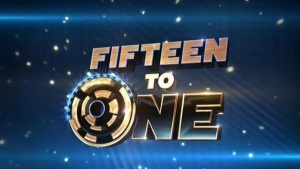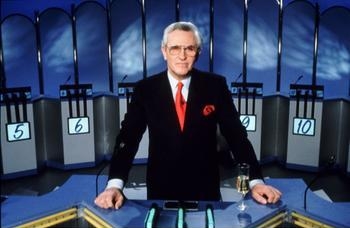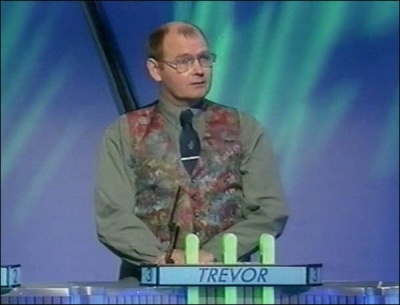Fifteen-to-One
(→Key moments) |
(→Fifteen-to-One More Time) |
||
| (58 intermediate revisions not shown) | |||
| Line 1: | Line 1: | ||
| - | <div class="image"> | + | <div class="image">[[File:Fifteen to one 2013 title.jpg|300px]]</div> |
<div class="box"> | <div class="box"> | ||
| + | |||
== Host == | == Host == | ||
[[William G. Stewart]] (1988-2003) | [[William G. Stewart]] (1988-2003) | ||
| - | Adam Hills (celebrity editions, 2013-) | + | [[Adam Hills]] (celebrity editions, 2013-5) |
| - | [[Sandi Toksvig]] (daytime editions, 2014-) | + | [[Sandi Toksvig]] (daytime editions, 2014-9) |
== Co-host == | == Co-host == | ||
| Line 18: | Line 19: | ||
Sarah Wynter (substitute)<br> | Sarah Wynter (substitute)<br> | ||
[[Jennie Bond]] (2013)<br> | [[Jennie Bond]] (2013)<br> | ||
| - | Dave Riley (2014-) | + | Dave Riley (2014)<br> |
| + | Bill Torrance (2014-16)<br> | ||
| + | Donald Pirie (2017-19) | ||
== Broadcast == | == Broadcast == | ||
| Line 24: | Line 27: | ||
Regent Productions for Channel 4, 11 January 1988 to 19 December 2003 (2265 episodes in 35 series) | Regent Productions for Channel 4, 11 January 1988 to 19 December 2003 (2265 episodes in 35 series) | ||
| - | Remedy and Argonon for Channel 4, 20 September 2013 to | + | Remedy Productions and Argonon for Channel 4, 20 September 2013 to 28 June 2019 (370 episodes in 10 series, plus 10 primetime specials) |
</div> | </div> | ||
| Line 34: | Line 37: | ||
Round one began with each of the fifteen contestants being asked two questions each. If they got one wrong they lost a life but if they got both of them wrong they were automatically eliminated. | Round one began with each of the fifteen contestants being asked two questions each. If they got one wrong they lost a life but if they got both of them wrong they were automatically eliminated. | ||
| - | <div class="image"> | + | <div class="image">[[File:Fifteentoone grandfinal set williamgstewart.jpg|400px]]''Questionmaster [[William G. Stewart]] (centre) gets ready to ask the questions to the fifteen contestants in the distinctive semi-circle behind him''</div> |
| - | + | ||
| - | ''Questionmaster [[William G. Stewart]] (centre) gets ready to ask the questions to the fifteen contestants in the distinctive semi-circle behind him''</div> | + | |
Round two was slightly different, a veritable mental duel meeting Hot Potato. A player was asked a question. If they got it wrong they lost a life. If they got it right they nominated whoever they wanted to answer the next question. If that person got it wrong the nominator got to choose somebody else. This kept going until there were only three people left. | Round two was slightly different, a veritable mental duel meeting Hot Potato. A player was asked a question. If they got it wrong they lost a life. If they got it right they nominated whoever they wanted to answer the next question. If that person got it wrong the nominator got to choose somebody else. This kept going until there were only three people left. | ||
| Line 64: | Line 65: | ||
=== School's out for Summer === | === School's out for Summer === | ||
| - | In 1999, the first (and, as it turned out, only) schools series started. Five pupils from three schools competed. In the first round, each child was asked two questions, winning 10 points for their team. In round two, each child faced three questions - 10 points if they answered it themselves, or 5 if they needed to confer. The final round was played with one nominated child from each school competing for 30 questions on the buzzer. This was the only time the "three lives" concept came into play - if they incorrectly answered any three questions, they were out of the game. | + | In 1999, the first (and, as it turned out, only) schools series started. Five pupils, some wearing school uniform, others not, from three secondary schools competed. In the first round, each child was asked two questions, winning 10 points for their team. In round two, each child faced three questions - 10 points if they answered it themselves, or 5 if they needed to confer. The final round was played with one nominated child from each school competing for 30 questions on the buzzer. This was the only time the "three lives" concept came into play - if they incorrectly answered any three questions, they were out of the game. |
| - | Some of the spirit of the show was lost by the de-emphasis on the three lives, but then again we can't have the kiddies upset, can we? | + | Some of the spirit of the show was lost by the de-emphasis on the three lives, but then again we can't have the kiddies (teenagers, actually) upset, can we? |
=== Fifteen-to-One More Time === | === Fifteen-to-One More Time === | ||
| - | + | A one-off celebrity revival was made in 2013 - the excuse was Channel 4 harking back to the past with a 1980s season. Adam Hills, the comedian, took the host's position, celebrities participated, there were changes to the graphics, theme tune and set, and the game was played for a cash prize. The viewing public liked it enough for Channel 4 to commission four more celebrity editions, and a run of 20 daytime shows hosted by Sandi Toksvig. This new version is enjoyable, although it has rather too many commercial breaks and, good hostess though Toksvig is, the show doesn't really give her the chance to show off her considerable comic skills. However, she has coined a new catchphrase for the show, used when contestants lose all their lives, "...But for you, it's lights out". | |
== Key moments == | == Key moments == | ||
| - | At the start of 1999, former series champion Bill McKaig scored the theoretical maximum of 433 points in the final round - by answering all 40 questions correctly at 10 points a throw, 10 points each for his three remaining lives, and 3 points for the three lives he had remaining from the first two rounds. | + | At the start of 1999, former series champion Bill McKaig scored the theoretical maximum of 433 points in the final round - by answering all 40 questions correctly at 10 points a throw, 10 points each for his three remaining lives, and 3 points for the three lives he had remaining from the first two rounds. Also of note is Daphne Fowler's score of 432. |
| - | + | ||
| - | + | ||
At the end of most grand finals, announcer Laura Calland appeared in-vision to present the champion with their prize. Although Laura later alternated with Phillip Lowrie, she was the announcer for the grand final. | At the end of most grand finals, announcer Laura Calland appeared in-vision to present the champion with their prize. Although Laura later alternated with Phillip Lowrie, she was the announcer for the grand final. | ||
| Line 82: | Line 81: | ||
On a few rare occasions, Stewart's full name was announced at the beginning of the programme, namely 'William Gladstone Stewart'. A pretty impressive name, eh? | On a few rare occasions, Stewart's full name was announced at the beginning of the programme, namely 'William Gladstone Stewart'. A pretty impressive name, eh? | ||
| - | That glorious | + | That glorious outtake (which was shown on ''Alright on the Night's Cockup Trip'') when WGS accidentally throws his question cards over his shoulder. |
<div class="image"><IMG src="/atoz/programmes/f/fifteen_to_one/15_to_1_droppedcards.jpg" width="275" height="206" border="0"> | <div class="image"><IMG src="/atoz/programmes/f/fifteen_to_one/15_to_1_droppedcards.jpg" width="275" height="206" border="0"> | ||
| Line 115: | Line 114: | ||
"That's us for today - we'll be back tomorrow, same time, same place, 4.30, Channel 4, we'll see you then". | "That's us for today - we'll be back tomorrow, same time, same place, 4.30, Channel 4, we'll see you then". | ||
| + | |||
| + | (Toksvig): "...But for you, it's lights out". | ||
== Inventor == | == Inventor == | ||
| Line 128: | Line 129: | ||
== Trivia == | == Trivia == | ||
| - | In 1999, the first schools series was commissioned. 25 of the leading players came together for the Millennium Quiz, on Christmas Day 1999 for a 110-minute behemoth of a show featuring 350 questions over five rounds. This was won by quiz regular [[Kevin Ashman]]. Other specials included a few celebrity specials, a | + | In 1999, the first schools series was commissioned. 25 of the leading players came together for the Millennium Quiz, on Christmas Day 1999 for a 110-minute behemoth of a show featuring 350 questions over five rounds. This was won by quiz regular [[Kevin Ashman]]. Other specials included a few celebrity specials, a special game show hosts edition for Comic Relief (with [[Gaby Roslin]], [[Phillip Schofield]], [[Suggs]], [[Tim Vine]], [[Dale Winton]], [[Anthea Turner]], [[John Leslie]], [[Jeremy Beadle]], [[Vanessa Feltz]], [[Des O'Connor]], [[Ainsley Harriott]], [[Bradley Walsh]], [[Emma Forbes]], [[Nicholas Parsons]] and [[Terry Wogan]]), special editions for Channel 4's "Bite the Ballot" season and its Soap Weekend. As part of C4's ''Without Walls'' arts strand, there was an hour-long feature on the Elgin Marbles. William G Stewart also took the subject in a 2007 edition of ''Celebrity [[Mastermind]]''. |
A special programme, called ''Fifteen-to-One Scrapbook'', provided a fascinating insight into the programme. It was presented by Stewart as well as voice-overs Calland and Lowrie in vision. As well as the usual banter about the Elgin Marbles, it covered topics such as what's on William G's question cards and an interview with the programme's eldest viewer. | A special programme, called ''Fifteen-to-One Scrapbook'', provided a fascinating insight into the programme. It was presented by Stewart as well as voice-overs Calland and Lowrie in vision. As well as the usual banter about the Elgin Marbles, it covered topics such as what's on William G's question cards and an interview with the programme's eldest viewer. | ||
| Line 136: | Line 137: | ||
In the later series, there was a write-in competition for viewers. Once the first fifteen shows had been aired (thereby filling the leaderboard), viewers had a week to send in a postcard with their prediction of the top and bottom scores on the leaderboard at the end of the series. All the correct answers went in a hat (or equivalent) and five were picked out, winning their senders £50 in book tokens. At least once, fewer than five correct entries were received, making a draw unnecessary, and on another occasion there were exactly six correct entries, so WGS just shelled out an extra £50 and gave them all prizes. When Bill McKaig scored his maximum, the feat was reported in the press before the closing date, so the prediction competition for that series was abandoned and the money was given to charity instead. | In the later series, there was a write-in competition for viewers. Once the first fifteen shows had been aired (thereby filling the leaderboard), viewers had a week to send in a postcard with their prediction of the top and bottom scores on the leaderboard at the end of the series. All the correct answers went in a hat (or equivalent) and five were picked out, winning their senders £50 in book tokens. At least once, fewer than five correct entries were received, making a draw unnecessary, and on another occasion there were exactly six correct entries, so WGS just shelled out an extra £50 and gave them all prizes. When Bill McKaig scored his maximum, the feat was reported in the press before the closing date, so the prediction competition for that series was abandoned and the money was given to charity instead. | ||
| - | ''Fifteen-to-One'' somewhat unexpectedly hit the headlines in 1998 when one of its former contestants, one Trevor Montague (pictured below), was sued by Regent Productions, the makers of the programme. Montague broke the rule which states that losers on the programme cannot take part again. However, after being knocked out in | + | ''Fifteen-to-One'' somewhat unexpectedly hit the headlines in 1998 when one of its former contestants, one Trevor Montague (pictured below), was sued by Regent Productions, the makers of the programme. Montague broke the rule which states that losers on the programme cannot take part again. However, after being knocked out in 1990, Mr Montague entered again in 1992 under the name Steve Romana, wearing a T-shirt and earrings to disguise his appearance. When a viewer in Nottinghamshire saw a repeat of the series on Challenge TV, they noticed the uncanny resemblance between Mr Montague and "Steve Romana", and contacted Channel 4. Montague had done a similar thing on [[The Krypton Factor]] - he had appeared as himself in the 1988 series and as 'Steve Romana' in the 1995 one, although whether it was picked up on in this case is not known. In 2001, Montague came out with a quiz compendium, ''The A-Z of Almost Everything'', with a foreword by [[Magnus Magnusson]]. |
| - | <div class="image"> | + | <div class="image">[[File:Fifteentoone trevormontague tie.jpg|400px]]''Trevor Montague''</div> |
| - | + | ||
| - | + | ||
The show sometimes had questions that, as Stewart would say, "You need to see this one as well as hear it". Rather bizarrely, the pictures would simply be on a card that Stewart would hold up in the earlier series - talk about low-tech! Only in later series did they bring in screen visuals. | The show sometimes had questions that, as Stewart would say, "You need to see this one as well as hear it". Rather bizarrely, the pictures would simply be on a card that Stewart would hold up in the earlier series - talk about low-tech! Only in later series did they bring in screen visuals. | ||
| Line 150: | Line 149: | ||
Over the 35 series, William G read out something approaching 350,000 questions. | Over the 35 series, William G read out something approaching 350,000 questions. | ||
| - | The credits on one show | + | The credits on one December 2003 show, won by series one, episode one runner-up Keith Pottage, listed the job of one contestant, Carl Majors from Ilfracombe, as a Fudge Packer - he jests, surely? |
In the 2000 Grand Final, the contestant at position 4 had to be edited out for legal reasons. In the first round, the questions jumped from position 3 to 5. Since the contestant was eliminated in that round, the rest of the show proceeded normally. | In the 2000 Grand Final, the contestant at position 4 had to be edited out for legal reasons. In the first round, the questions jumped from position 3 to 5. Since the contestant was eliminated in that round, the rest of the show proceeded normally. | ||
| + | |||
| + | The first episode of the 2018 series was dedicated to [[William G. Stewart]], who died while that series was in production - and some 13 months before it was actually broadcast. Somewhat bizarrely, the fifteenth episode of the 2019 series contained a dedication to Lord Michael Spicer, despite him not having any connection to either Fifteen-to-One or any game shows, though episode twenty-five contained a dedication to contestant Andrea Jones, who had died between the series being recorded and broadcast. Andy Tucker used his series win to give a shout-out to the neurosurgeons at Southampton, which was nice. | ||
== Champions == | == Champions == | ||
| Line 158: | Line 159: | ||
{| | {| | ||
|'''1988''' | |'''1988''' | ||
| - | |Jon Goodwin ||'''1997''' ||Trevor Montague | + | |Jon Goodwin ||'''1997''' ||Trevor Montague|| '''2014''' || Dave McBryan |
|- | |- | ||
| | | | ||
| - | |Mal Collier || || Bill Francis | + | |Mal Collier || || Bill Francis|| || Gerard Mackay |
|- | |- | ||
|'''1989''' | |'''1989''' | ||
| - | |[[Kevin Ashman]] || || Nick Terry | + | |[[Kevin Ashman]] || || Nick Terry|| '''2015''' || Peter Finan |
|- | |- | ||
| | | | ||
| - | |Andrew Francis ||'''1998''' || Nick Terry | + | |Andrew Francis ||'''1998''' || Nick Terry || || Ailsa Watson |
|- | |- | ||
|'''1990''' | |'''1990''' | ||
| - | |Anthony Martin || || Bill McKaig | + | |Anthony Martin || || Bill McKaig || '''2016''' || Gareth Moore |
|- | |- | ||
| | | | ||
| - | |Mike Kirby || ||Paul Hillman | + | |Mike Kirby || ||Paul Hillman || || Huw Pritchard |
|- | |- | ||
|'''1991''' | |'''1991''' | ||
| - | |Thomas Dyer ||'''1999''' || Nick Terry | + | |Thomas Dyer ||'''1999''' || Nick Terry || '''2017''' || Ross Goodwin |
|- | |- | ||
| | | | ||
| - | |Anthony Martin || || Nick Terry again | + | |Anthony Martin || || Nick Terry again || || Max Espensen |
|- | |- | ||
|'''1992''' | |'''1992''' | ||
| - | |Julian Allen ||'''2000''' || Les Arnott | + | |Julian Allen ||'''2000''' || Les Arnott || '''2018''' || Ryland Morgan |
|- | |- | ||
| | | | ||
| - | |Barbara Thompson || || Dag Griffiths | + | |Barbara Thompson || || Dag Griffiths || '''2019''' || Andy Tucker |
|- | |- | ||
|'''1993''' | |'''1993''' | ||
| Line 223: | Line 224: | ||
====Celebrity Fifteen-to-One==== | ====Celebrity Fifteen-to-One==== | ||
*'''1990''': [[Nigel Rees]] | *'''1990''': [[Nigel Rees]] | ||
| - | *'''1992''': | + | *'''1992''': Patrick Stoddart |
*'''2013''': [[Jo Brand]] | *'''2013''': [[Jo Brand]] | ||
| + | *'''2014''': Josie Long, Stephen Mangan, [[Dave Gorman]], Sian Williams, [[Rufus Hound]] | ||
| + | *'''2015''': Alex James, Kate Humble, Gary Delaney, Tanni Grey-Thompson | ||
====Other special editions==== | ====Other special editions==== | ||
| Line 249: | Line 252: | ||
== Web links == | == Web links == | ||
| + | |||
| + | [http://www.channel4.com/programmes/fifteen-to-one Channel 4 programme page] | ||
[http://625.uk.com/15to1/index.htm Andrew Wiseman's page] | [http://625.uk.com/15to1/index.htm Andrew Wiseman's page] | ||
| Line 257: | Line 262: | ||
[http://en.wikipedia.org/wiki/Fifteen_To_One Wikipedia entry] | [http://en.wikipedia.org/wiki/Fifteen_To_One Wikipedia entry] | ||
| - | |||
| - | |||
== See also == | == See also == | ||
| - | Weaver's Week: [[Weaver's Week 2003-12-13|Fifteen To One Remembered]] (2003) | + | Weaver's Week: [[Weaver's Week 2003-12-13|Fifteen To One Remembered]] (2003); the [[Weaver's Week 2013-09-29|celebrity]] and [[Weaver's Week 2014-04-20|daytime]] revivals. |
[[Category:General Knowledge Quiz]] | [[Category:General Knowledge Quiz]] | ||
[[Category:Long-Running]] | [[Category:Long-Running]] | ||
[[Category:Channel 4 Programmes]] | [[Category:Channel 4 Programmes]] | ||
| - | |||
Current revision as of 22:18, 25 March 2024
Contents |
Host
William G. Stewart (1988-2003)
Adam Hills (celebrity editions, 2013-5)
Sandi Toksvig (daytime editions, 2014-9)
Co-host
Announcer:
Anthony Hyde (1988-9)
Laura Calland (1989-2003)
Philip Lowrie (alternating)
Sarah Wynter (substitute)
Jennie Bond (2013)
Dave Riley (2014)
Bill Torrance (2014-16)
Donald Pirie (2017-19)
Broadcast
Regent Productions for Channel 4, 11 January 1988 to 19 December 2003 (2265 episodes in 35 series)
Remedy Productions and Argonon for Channel 4, 20 September 2013 to 28 June 2019 (370 episodes in 10 series, plus 10 primetime specials)
Synopsis
Words can't describe how simple yet brilliant this show was, but we'll try. Fifteen contestants started off with three lives and the idea was to not lose lives by not getting questions wrong. Simple! Yet brilliant.
Round one began with each of the fifteen contestants being asked two questions each. If they got one wrong they lost a life but if they got both of them wrong they were automatically eliminated.
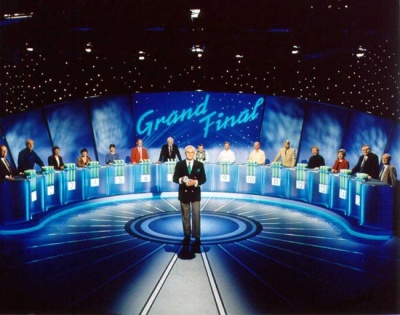 Questionmaster William G. Stewart (centre) gets ready to ask the questions to the fifteen contestants in the distinctive semi-circle behind him
Questionmaster William G. Stewart (centre) gets ready to ask the questions to the fifteen contestants in the distinctive semi-circle behind himRound two was slightly different, a veritable mental duel meeting Hot Potato. A player was asked a question. If they got it wrong they lost a life. If they got it right they nominated whoever they wanted to answer the next question. If that person got it wrong the nominator got to choose somebody else. This kept going until there were only three people left.
Question or Nominate?
After the break, the three people left were given a single point for every life they had left before the break and a clean set of three lives. The idea now was to get a high a score as possible. This round had forty questions and each answer was worth ten points. The first questions were on the buzzers but as soon as somebody got over thirty points it changed to 'Question or Nominate'. If they chose 'Question' they took a question themselves, to build up their score, and if they chose 'Nominate' somebody else took the question. No matter what your score, if you lost your three lives you were out.
When there was only one person left they were the winner but they were allowed to answer as many of the remaining questions as they could to build up their score and if they made it past the 40th question they were given a ten-point bonus for every life they had left.
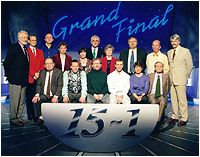 The Grand Final
The Grand FinalAt the end of the series the top fifteen scoring players battled it out in the ultimate duel which was the Grand Final for a piece of two-thousand year old pot, usually.
Overall, the programme was usually engrossing - when you got an interesting episode, you got an interesting episode. It was a crying shame they axed it at the end of 2003 in favour of Beat the Nation, which admittedly isn't bad but not a patch on this fine show.
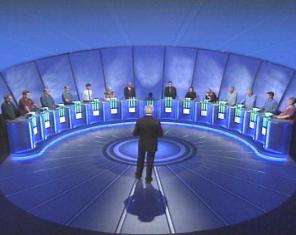 A more recent version of the set
A more recent version of the setSchool's out for Summer
In 1999, the first (and, as it turned out, only) schools series started. Five pupils, some wearing school uniform, others not, from three secondary schools competed. In the first round, each child was asked two questions, winning 10 points for their team. In round two, each child faced three questions - 10 points if they answered it themselves, or 5 if they needed to confer. The final round was played with one nominated child from each school competing for 30 questions on the buzzer. This was the only time the "three lives" concept came into play - if they incorrectly answered any three questions, they were out of the game.
Some of the spirit of the show was lost by the de-emphasis on the three lives, but then again we can't have the kiddies (teenagers, actually) upset, can we?
Fifteen-to-One More Time
A one-off celebrity revival was made in 2013 - the excuse was Channel 4 harking back to the past with a 1980s season. Adam Hills, the comedian, took the host's position, celebrities participated, there were changes to the graphics, theme tune and set, and the game was played for a cash prize. The viewing public liked it enough for Channel 4 to commission four more celebrity editions, and a run of 20 daytime shows hosted by Sandi Toksvig. This new version is enjoyable, although it has rather too many commercial breaks and, good hostess though Toksvig is, the show doesn't really give her the chance to show off her considerable comic skills. However, she has coined a new catchphrase for the show, used when contestants lose all their lives, "...But for you, it's lights out".
Key moments
At the start of 1999, former series champion Bill McKaig scored the theoretical maximum of 433 points in the final round - by answering all 40 questions correctly at 10 points a throw, 10 points each for his three remaining lives, and 3 points for the three lives he had remaining from the first two rounds. Also of note is Daphne Fowler's score of 432.
At the end of most grand finals, announcer Laura Calland appeared in-vision to present the champion with their prize. Although Laura later alternated with Phillip Lowrie, she was the announcer for the grand final.
On a few rare occasions, Stewart's full name was announced at the beginning of the programme, namely 'William Gladstone Stewart'. A pretty impressive name, eh?
That glorious outtake (which was shown on Alright on the Night's Cockup Trip) when WGS accidentally throws his question cards over his shoulder.
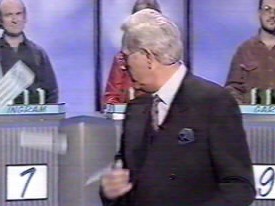 "Two questions each in the first round... oh, bugger"
"Two questions each in the first round... oh, bugger"And who's that at number 7? It's future WWTBAM jackpot winner Ingram Wilcox.
One rather interesting moment came around 1997 when three episodes were transmitted in the wrong order - as was revealed by the finals board (which was shown at the end of every show).
Catchphrases
...are all here to play Fifteen-to-One, introduced by William G. Stewart.
"Two questions each in the first round, ladies and gentlemen, and I'll need one correct answer from you to survive..."
"...And you need to see this one as well as hear it..."
Laura, please? (or sometimes, "Philip, please?")
...and of the remaining (x) contestants, (y) still have their three lives intact.
"(Whoever), you face the question in this second round. Give me an incorrect answer and you lose one of those (x) lives - give me a correct answer and we can start nominating..."
"A number, please?"
"As it should be, twelve down, three to go, and after the break (the three contestants) will here for the final - don't go too far away - we'll see you then".
The three surviving contestants in today's Fifteen-to-One final are...
"...Give me three correct answers and we can start nominating..."
"Question or nominate?"
"That's us for today - we'll be back tomorrow, same time, same place, 4.30, Channel 4, we'll see you then".
(Toksvig): "...But for you, it's lights out".
Inventor
Based on an original idea by John M. Lewis.
An interview with John M. Lewis can be found at Andrew Wiseman's 625 page.
Theme music
Paul McGuire was credited as "Musical Director". The 2013 revival had a reworking by Marc Sylvan and Richard Jacques.
Trivia
In 1999, the first schools series was commissioned. 25 of the leading players came together for the Millennium Quiz, on Christmas Day 1999 for a 110-minute behemoth of a show featuring 350 questions over five rounds. This was won by quiz regular Kevin Ashman. Other specials included a few celebrity specials, a special game show hosts edition for Comic Relief (with Gaby Roslin, Phillip Schofield, Suggs, Tim Vine, Dale Winton, Anthea Turner, John Leslie, Jeremy Beadle, Vanessa Feltz, Des O'Connor, Ainsley Harriott, Bradley Walsh, Emma Forbes, Nicholas Parsons and Terry Wogan), special editions for Channel 4's "Bite the Ballot" season and its Soap Weekend. As part of C4's Without Walls arts strand, there was an hour-long feature on the Elgin Marbles. William G Stewart also took the subject in a 2007 edition of Celebrity Mastermind.
A special programme, called Fifteen-to-One Scrapbook, provided a fascinating insight into the programme. It was presented by Stewart as well as voice-overs Calland and Lowrie in vision. As well as the usual banter about the Elgin Marbles, it covered topics such as what's on William G's question cards and an interview with the programme's eldest viewer.
For a time, the show was made and aired in a super-widescreen 2:1 picture format. The resulting "deep letterboxing" (this was before widescreen TVs became commonplace) certainly gave the show a distinctive look, though it was fairly soon abandoned in favour of the more conventional 16:9 widescreen panorama.
In the later series, there was a write-in competition for viewers. Once the first fifteen shows had been aired (thereby filling the leaderboard), viewers had a week to send in a postcard with their prediction of the top and bottom scores on the leaderboard at the end of the series. All the correct answers went in a hat (or equivalent) and five were picked out, winning their senders £50 in book tokens. At least once, fewer than five correct entries were received, making a draw unnecessary, and on another occasion there were exactly six correct entries, so WGS just shelled out an extra £50 and gave them all prizes. When Bill McKaig scored his maximum, the feat was reported in the press before the closing date, so the prediction competition for that series was abandoned and the money was given to charity instead.
Fifteen-to-One somewhat unexpectedly hit the headlines in 1998 when one of its former contestants, one Trevor Montague (pictured below), was sued by Regent Productions, the makers of the programme. Montague broke the rule which states that losers on the programme cannot take part again. However, after being knocked out in 1990, Mr Montague entered again in 1992 under the name Steve Romana, wearing a T-shirt and earrings to disguise his appearance. When a viewer in Nottinghamshire saw a repeat of the series on Challenge TV, they noticed the uncanny resemblance between Mr Montague and "Steve Romana", and contacted Channel 4. Montague had done a similar thing on The Krypton Factor - he had appeared as himself in the 1988 series and as 'Steve Romana' in the 1995 one, although whether it was picked up on in this case is not known. In 2001, Montague came out with a quiz compendium, The A-Z of Almost Everything, with a foreword by Magnus Magnusson.
The show sometimes had questions that, as Stewart would say, "You need to see this one as well as hear it". Rather bizarrely, the pictures would simply be on a card that Stewart would hold up in the earlier series - talk about low-tech! Only in later series did they bring in screen visuals.
In 1997, Fifteen-to-One took part in a trial of interactive television, allowing up to four people to play along at home using special remote controllers. The manufacturers, Two Way TV, claimed that one family went so far as to cancel their summer holiday in order to maintain their position on the leaderboard.
Not only did William G both present and produce the show, he was also involved in writing the questions, particularly those on historical subjects.
Over the 35 series, William G read out something approaching 350,000 questions.
The credits on one December 2003 show, won by series one, episode one runner-up Keith Pottage, listed the job of one contestant, Carl Majors from Ilfracombe, as a Fudge Packer - he jests, surely?
In the 2000 Grand Final, the contestant at position 4 had to be edited out for legal reasons. In the first round, the questions jumped from position 3 to 5. Since the contestant was eliminated in that round, the rest of the show proceeded normally.
The first episode of the 2018 series was dedicated to William G. Stewart, who died while that series was in production - and some 13 months before it was actually broadcast. Somewhat bizarrely, the fifteenth episode of the 2019 series contained a dedication to Lord Michael Spicer, despite him not having any connection to either Fifteen-to-One or any game shows, though episode twenty-five contained a dedication to contestant Andrea Jones, who had died between the series being recorded and broadcast. Andy Tucker used his series win to give a shout-out to the neurosurgeons at Southampton, which was nice.
Champions
| 1988 | Jon Goodwin | 1997 | Trevor Montague | 2014 | Dave McBryan |
| Mal Collier | Bill Francis | Gerard Mackay | |||
| 1989 | Kevin Ashman | Nick Terry | 2015 | Peter Finan | |
| Andrew Francis | 1998 | Nick Terry | Ailsa Watson | ||
| 1990 | Anthony Martin | Bill McKaig | 2016 | Gareth Moore | |
| Mike Kirby | Paul Hillman | Huw Pritchard | |||
| 1991 | Thomas Dyer | 1999 | Nick Terry | 2017 | Ross Goodwin |
| Anthony Martin | Nick Terry again | Max Espensen | |||
| 1992 | Julian Allen | 2000 | Les Arnott | 2018 | Ryland Morgan |
| Barbara Thompson | Dag Griffiths | 2019 | Andy Tucker | ||
| 1993 | Anthony Martin | Matti Watton | |||
| Glen Binnie | 2001 | Daphne Fowler | |||
| 1994 | Stanley Miller | Daphne Fowler again | |||
| Leslie Booth | 2002 | Matti Watton | |||
| 1995 | Leslie Booth | David Good | |||
| Ian Potts | 2003 | Jack Welsby / David Stedman (tie) | |||
| 1996 | Arnold O'Hara | John Harrison | |||
| Martin Riley |
Champion of Champions
- 1997 Mal Collier
Millennium Quiz
- 1999 Kevin Ashman
Schools Series
- 1999 Audenshaw School
Celebrity Fifteen-to-One
- 1990: Nigel Rees
- 1992: Patrick Stoddart
- 2013: Jo Brand
- 2014: Josie Long, Stephen Mangan, Dave Gorman, Sian Williams, Rufus Hound
- 2015: Alex James, Kate Humble, Gary Delaney, Tanni Grey-Thompson
Other special editions
- The Money-Go-Round (1 May 1994): not known
- Soapsuds (3 December 1995): not known
Merchandise
Fifteen to One - 2002 for 2002
Book: 2002 questions from the hit TV show
Fifteen to One - 2001 for 2001
Book: 2001 questions from the hit TV show
Fifteen to One - 2000 for 2000
Book: 2000 questions from the hit TV show
Brain Men: A Passion to Compete by Marcus Berkmann
Not only is this an extremely comprehensive revue of Quiz Culture, it has the added advantage of being hilarious. The book covers everything from pub quizzes to Fifteen-to-One (on which the author appeared twice), and from trivia machines to quiz tournaments. Highly recommended for any quiz fan.
Web links
15 to 1 heaven (from 2004, via archive.org)
Quizplayers's 433 challenge - See if you could match Bill McKaig's feat
See also
Weaver's Week: Fifteen To One Remembered (2003); the celebrity and daytime revivals.

